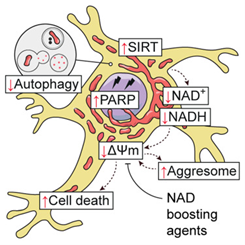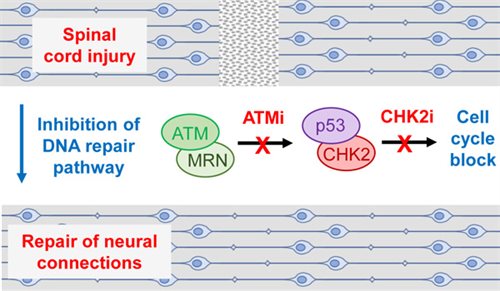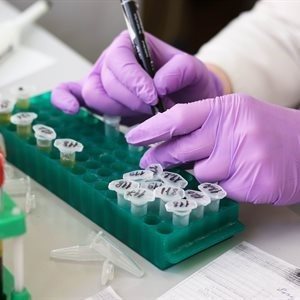Translational Biology and Genetics
 We are investigating the mechanisms by which cancer mutations deregulate the normal processes of cellular function and growth. We use genome-wide profiling to screen different classes of cancer, such as colorectal cancer, for potential mutations and biomarkers. We study how cancer evolves, and are developing better molecular and cellular cancer models for designing and testing new therapies.
We are investigating the mechanisms by which cancer mutations deregulate the normal processes of cellular function and growth. We use genome-wide profiling to screen different classes of cancer, such as colorectal cancer, for potential mutations and biomarkers. We study how cancer evolves, and are developing better molecular and cellular cancer models for designing and testing new therapies.
For example, Professor Andrew Beggs’ research is looking at devising organoid models to offer personalised medicine treatments for colorectal cancer patients, and Professor Richard Bryan is developing a 23-gene panel for a non-invasive diagnosis for bladder cancer. In 2022 Andrew Beggs was awarded a £1.5 million MRC Senior Clinical Fellowship to continue using organoid models to study mechanisms of treatment resistance in colorectal cancer.
Theme Lead

Professor Mathew Coleman
Professor in Tumour Cell Biology
View profile
Research Groups
Spotlight on neuronal cell death linked to NAD depletion during loss of autophagy
Researchers at the University of Birmingham have shown that autophagy is essential for maintaining normal NAD levels and mitochondrial function. Loss of autophagy genes results in depletion of NAD, leading to mitochondrial depolarisation and cell death in neurons.
Cell Reports 42:112372 (2023). Sun C, E Seranova, MA Cohen, M Chipara, J Roberts, D Astuti, . . . VI Korolchuk and S Sarkar. NAD depletion mediates cytotoxicity in human neurons with autophagy deficiency.
Developmental Cell 57:2584-2598 e2511 (2022). Kataura T, L Sedlackova, EG Otten, R Kumari, D Shapira, F Scialo, R Stefanatos, K Ishikawa, G Kelly, E Seranova, C Sun . . . . . .S Sarkar and VI Korolchuk. Autophagy promotes cell survival by maintaining NAD levels.
 Autophagy is a cellular catabolic process that mediates recycling of undesirable intracellular components such as aggregated proteins and damaged organelles like mitochondria to maintain proper homeostasis of cells and is also needed to preserve energy levels within cells. Two joint studies by Sovan Sarkar at the University of Birmingham and Viktor Korolchuk at Newcastle University have now shown an essential role of autophagy in ensuring cell survival by preserving the levels of nicotinamide adenine dinucleotide (NAD). Enzymes that consume NAD, such as PARP and Sirtuins, are hyperactive in autophagy-deficient cells, leading to cellular depletion of NAD. Loss of autophagy by knockout of essential autophagy gene ATG5 results in NAD exhaustion, leading to mitochondrial membrane depolarisation and cell death in human embryonic stem cells and in human neurons. This cytotoxic cascade is shown to be evolutionarily conserved from yeast to humans. These findings help explain the basis of neurodegeneration and lysosomal storage disorders linked to autophagic defects. This story was also the subject of a UoB press release.
Autophagy is a cellular catabolic process that mediates recycling of undesirable intracellular components such as aggregated proteins and damaged organelles like mitochondria to maintain proper homeostasis of cells and is also needed to preserve energy levels within cells. Two joint studies by Sovan Sarkar at the University of Birmingham and Viktor Korolchuk at Newcastle University have now shown an essential role of autophagy in ensuring cell survival by preserving the levels of nicotinamide adenine dinucleotide (NAD). Enzymes that consume NAD, such as PARP and Sirtuins, are hyperactive in autophagy-deficient cells, leading to cellular depletion of NAD. Loss of autophagy by knockout of essential autophagy gene ATG5 results in NAD exhaustion, leading to mitochondrial membrane depolarisation and cell death in human embryonic stem cells and in human neurons. This cytotoxic cascade is shown to be evolutionarily conserved from yeast to humans. These findings help explain the basis of neurodegeneration and lysosomal storage disorders linked to autophagic defects. This story was also the subject of a UoB press release.
Spotlight on Drugs that promote spinal cord repair after injury
Science Advances 8 (2022) eabq2611.Taylor MJ, Thompson AM, Alhajlah S, Tuxworth RI, Ahmed Z. Inhibition of Chk2 promotes neuroprotection, axon regeneration, and functional recovery after CNS injury.
Clinical and Translational Medicine 12 (2022) e962. Ahmed Z, Tuxworth RI. The brain-penetrant ATM inhibitor, AZD1390, promotes axon regeneration and functional recovery in preclinical models of spinal cord injury.

Ground-breaking recent studies from the Ahmed and Tuxworth laboratories have shown that 2 drugs designed to cure cancer can now potentially be used to promote spinal cord and optic nerve repair after injury. Anti-cancer drugs that target either ATM or CHK2 in the DNA repair pathway promote the survival of neurons and the re-growth of axons across sites of nerve damage. DNA double strand breaks in damaged neurons normally trigger a DNA damage response that blocks regrowth of axons and often results in cell death. Remarkably, inhibition of the ATM/CHK2 pathway led to a return of normal transmission of nerve impulses across damaged spinal cords or optic nerves in models of injury in animals where electrical transmission across damaged neurons had been blocked. When these drugs were given within 24 hours of spinal cord injury in animal models, they promoted full recovery of hind limb function and sensation within a few weeks. These drugs are already in development or in use for cancer and may in the future be investigated for their potential use to promote recovery from spinal cord injury in people.
Spotlight on the Regulation of Carcinogenesis in Colorectal Cancer
Proc Natl Acad Sci U S A 118 (2021) e2011411118. Andrijes R, RK Hejmadi, M Pugh, S Rajesh, V Novitskaya, M Ibrahim, ….. A Beggs, F Berditchevski. Tetraspanin 6 is a regulator of carcinogenesis in colorectal cancer. doi: 10.1073/pnas.2011411118

Bowel cancer patients expressing high levels of the membrane-bound protein TPSPAN6 are more likely to respond to treatment with Cetuximab, a monoclonal antibody inhibitor of the EGF receptor. Previously it has been difficult to identify bowel cancer patients likely to benefit from Cetuximab because only some of these patients respond to therapy, partly due to the fact a subset of these patients have KRAS mutations, and these patients may not even be eligible for Cetuximab. This study in PNAS from the groups of Fedor Berditchevski and Andrew Beggs reveals that TSPAN6 is a tumour suppressor that blocks the autocrine expression of membrane bound TGFa on vesicles that activate EGFR signalling. High levels of TSPAN6 expression are associated with enhanced sensitivity to Cetuximab, regardless of the KRAS mutation status. These finding may pave the way for personalised therapy in bowel cancer whereby TSPAN6 can be used as a biomarker to target patients most likely to benefit from Cetuximab, including those with KRAS mutations.
Spotlight on COVID-19 and Cancer Patients
Cancer Cell 38:306-307 (2020). Lee LYW, T Hill, O Topping, M Tilby, M Baker, J Greig, . . . UKBCCC- Project. Utility of COVID-19 Screening in Cancer Patients.

Cancer patients are at increased risk from COVID-19. In this study led by Lennard Lee COVID-19 tests were performed in 1,226 patients as part of the UK Birmingham Chemotherapy Cancer COVID-19 cohort. Uptake of screening was 98.2%, with an asymptomatic infection prevalence of 0.6%. This study concluded that where the incidence of asymptomatic infection is low and patients can be identified early, screening gives clinicians the confidence to safely deliver effective cancer care in the era of COVID-19.
Selected Highlights from this research theme
Cell Reports 42:112372 (2023). Sun C, E Seranova, MA Cohen, M Chipara, J Roberts, D Astuti, . . . VI Korolchuk and S Sarkar. NAD depletion mediates cytotoxicity in human neurons with autophagy deficiency.
Stem Cell Reports 18:1090-1106 (2023). Zatyka M, TR Rosenstock, C Sun, AM Palhegyi, GW Hughes, S Lara-Reyna, . . . T Barret and S Sarkar. Depletion of WFS1 compromises mitochondrial function in hiPSC-derived neuronal models of Wolfram syndrome.
Eur Urol Oncol 6:67-75 (2023). Ward DG, L Baxter, S Ott, NS Gordon, J Wang, P Patel, . . . R Bryan, BladderPath Trial Management Group. Highly Sensitive and Specific Detection of Bladder Cancer via Targeted Ultra-deep Sequencing of Urinary DNA.
Cell Reports 42:112207 (2023). Molostvov G, M Gachechiladze, AM Shaaban, S Hayward, I Dean, IHK Dias, . . . F Berditchevski. Tspan6 stimulates the chemoattractive potential of breast cancer cells for B cells in an EV- and LXR-dependent manner.
Developmental Cell 57:2584-2598 e2511 (2022). Kataura T, L Sedlackova, EG Otten, R Kumari, D Shapira, F Scialo, . . .S Sarkar and VI Korolchuk. Autophagy promotes cell survival by maintaining NAD levels.
Pediatr Radiol 52:1134-1149 (2022). Withey SB, L MacPherson, A Oates, S Powell, J Novak, L Abernethy, . . . AC Peet. Dynamic susceptibility-contrast magnetic resonance imaging with contrast agent leakage correction aids in predicting grade in pediatric brain tumours: a multicenter study.
Sci Adv 8:eabq2611 (2022). Taylor MJ, AM Thompson, S Alhajlah, RI Tuxworth and Z Ahmed. Inhibition of Chk2 promotes neuroprotection, axon regeneration, and functional recovery after CNS injury.
Clin Transl Med 12:e962 (2022). Ahmed Z and RI Tuxworth. The brain-penetrant ATM inhibitor, AZD1390, promotes axon regeneration and functional recovery in preclinical models of spinal cord injury.
Eur Urol Oncol Online: DOI: 10.1016/j.euo.2022.03.005 (2022). Ward DG, L Baxter, S Ott, NS Gordon, J Wang, P Patel, . . . R Bryan, G BladderPath Trial Management Group. Highly Sensitive and Specific Detection of Bladder Cancer via Targeted Ultra-deep Sequencing of Urinary DNA.
Am J Hum Genet 109:953-960 (2022). Palles C, HD West, E Chew, S Galavotti, C Flensburg, JE Grolleman, . . . RM de Voer. Germline MBD4 deficiency causes a multi-tumor predisposition syndrome.
Genome Med 14:59 (2022). Goel A, DG Ward, B Noyvert, M Yu, NS Gordon, B Abbotts, . . . RT Bryan. Combined exome and transcriptome sequencing of non-muscle-invasive bladder cancer: associations between genomic changes, expression subtypes, and clinical outcomes.
Gut Online: doi: 10.1136/gutjnl-2021-326698 (2022). Schroder J, L Chegwidden, C Maj, J Gehlen, J Speller, AC Bohmer, . . . C Palles, J Schumacher. GWAS meta-analysis of 16 790 patients with Barrett's oesophagus and oesophageal adenocarcinoma identifies 16 novel genetic risk loci and provides insights into disease aetiology beyond the single marker level.
Eur Urol 80:12-15 (2021). Bryan RT, W Liu, SJ Pirrie, R Amir, J Gallagher, AI Hughes, . . . P Patel, ND James. Comparing an Imaging-guided Pathway with the Standard Pathway for Staging Muscle-invasive Bladder Cancer: Preliminary Data from the BladderPath Study.
Cancers (Basel) 13:2779 (2021). Dragomir I, A Akbar, JW Cassidy, N Patel, HW Clifford and G Contino. Identifying Cancer Drivers Using DRIVE: A Feature-Based Machine Learning Model for a Pan-Cancer Assessment of Somatic Missense Mutations.
Clin Microbiol Infect 27:1348 e1341-1348 e1347 (2021). Ptasinska A, C Whalley, A Bosworth, C Poxon, C Bryer, N Machin, . . . AD Beggs. Diagnostic accuracy of loop-mediated isothermal amplification coupled to nanopore sequencing (LamPORE) for the detection of SARS-CoV-2 infection at scale in symptomatic and asymptomatic populations.
Epigenomes 5:6 (2021). Whalley C, K Payne, E Domingo, A Blake, S Richman, J Brooks, . . . AD Beggs. Ultra-Low DNA Input into Whole Genome Methylation Assays and Detection of Oncogenic Methylation and Copy Number Variants in Circulating Tumour DNA.
PNAS (Proceedings of the National Academy of Sciences of the United States of America) 118 (39) e2011411118 (2021) Regina Andrijes, Rahul K. Hejmadi, Matthew Pugh, Sundaresan Rajesh, Vera Novitskaya, Maha Ibrahim, Michael Overduin, Chris Tselepis, Gary W. Middleton, Balázs Győrffy, Andrew D. Beggs, and Fedor Berditchevski Tetraspanin 6 is a regulator of carcinogenesis in colorectal cancer.
Cancers (Basel) 13:1497(2021). Palles C, S Fotheringham, L Chegwidden, M Lucas, R Kerr, G Mozolowski, . . . D Kerr. An Evaluation of the Diagnostic Accuracy of a Panel of Variants in DPYD and a Single Variant in ENOSF1 for Predicting Common Capecitabine Related Toxicities.
Cancer Research 81:1667-1680 (2021). Zhang P, I Kitchen-Smith, L Xiong, G Stracquadanio, K Brown, PH Richter, . . . GL Bond. Germline and somatic genetic variants in the p53 pathway interact to affect cancer risk, progression, and drug response.
J Medical Genetics 58: 392-299 (2020). Di Giovannantonio M, BH Harris, P Zhang, I Kitchen-Smith, L Xiong, N Sahgal, . . . GL Bond. Heritable genetic variants in key cancer genes link cancer risk with anthropometric traits.
British J Cancer 122:1231-1241 (2020). Surakhy M, M Wallace, E Bond, LF Grochola, H Perez, M Di Giovannantonio, . . . GL Bond. A common polymorphism in the retinoic acid pathway modifies adrenocortical carcinoma age-dependent incidence.
Cancers (Basel) 12:1278 (2020). Wanigasooriya K, R Tyler, JD Barros-Silva, Y Sinha, T Ismail and AD Beggs. Radiosensitising Cancer Using Phosphatidylinositol-3-Kinase (PI3K), Protein Kinase B (AKT) or Mammalian Target of Rapamycin (mTOR) Inhibitors.
Lancet 395:1268-1277 (2020). Birtle A, M Johnson, J Chester, R Jones, D Dolling, RT Bryan, . . . E Hall. Adjuvant chemotherapy in upper tract urothelial carcinoma (the POUT trial): a phase 3, open-label, randomised controlled trial.
Clin Oncol (R Coll Radiol) 10:1016 (2020). Best J, T Starkey, A Chatterjee, D Fackrell, L Pettit, N Srihari, . . . JB Cazier, LYW Lee. Coronavirus Disease 2019: the Pivotal Role of UK Clinical Oncology and the UK Coronavirus Cancer Monitoring Project.
J Clin Virol 128:104469 (2020). Bosworth A, C Whalley, C Poxon, K Wanigasooriya, O Pickles, EL Aldera, . . . AD Beggs. Rapid implementation and validation of a cold-chain free SARS-CoV-2 diagnostic testing workflow to support surge capacity.
Lancet Oncol 21:1309-1316 (2020). Lee LYW, JB Cazier, T Starkey, SEW Briggs, R Arnold, V Bisht, . . . UKCCMP Team. COVID-19 prevalence and mortality in patients with cancer and the effect of primary tumour subtype and patient demographics: a prospective cohort study.
J Mol Biol 432:2754-2798 (2020). Seranova E, AM Palhegyi, S Verma, S Dimova, R Lasry, M Naama, . . . S Sarkar. Human Induced Pluripotent Stem Cell Models of Neurodegenerative Disorders for Studying the Biomedical Implications of Autophagy.
Cancer Cell 38:306-307 (2020). Lee LYW, T Hill, O Topping, M Tilby, M Baker, J Greig, . . . UKBCCC- Project. Utility of COVID-19 Screening in Cancer Patients.
J Mol Biol 432:2735-2753 (2020). Zatyka M, S Sarkar and T Barrett. Autophagy in Rare (NonLysosomal) Neurodegenerative Diseases.
Brain Commun 1:fcz005 (2019). Tuxworth RI, MJ Taylor, A Martin Anduaga, A Hussien-Ali, S Chatzimatthaiou, J Longland, . . . Z Ahmed. Attenuating the DNA damage response to double-strand breaks restores function in models of CNS neurodegeneration.
Sci Rep 9:15592 (2019). Connolly KJ, MB O'Hare, A Mohammed, KM Aitchison, NC Anthoney, MJ Taylor, . . . RI Tuxworth, G Tear. The neuronal ceroid lipofuscinosis protein Cln7 functions in the postsynaptic cell to regulate synapse development.
N Engl J Med 381:637-646 (2019). Tamborlane WV, M Barrientos-Perez, U Fainberg, H Frimer-Larsen, M Hafez, PM Hale, . . . T Barrett, Ellipse Trial. Liraglutide in Children and Adolescents with Type 2 Diabetes.
Cancer Cell 30:578-594 (2016). Bardella C, O Al-Dalahmah, D Krell, P Brazauskas, K Al-Qahtani, M Tomkova, . . . I Tomlinson. Expression of Idh1(R132H) in the Murine Subventricular Zone Stem Cell Niche Recapitulates Features of Early Gliomagenesis.
Mol Cell 53:645-654 (2014). Feng T, A Yamamoto, SE Wilkins, E Sokolova, LA Yates, M Munzel, . . . ML Coleman. Optimal translational termination requires C4 lysyl hydroxylation of eRF1.
Oncogene 32:5333-5337 (2013). Beggs AD, E Domingo, M Abulafi, SV Hodgson and IP Tomlinson. A study of genomic instability in early preneoplastic colonic lesions.
Nat Genet 45:136-144 (2013). Palles C, JB Cazier, KM Howarth, E Domingo, AM Jones, P Broderick, . . . I Tomlinson. Germline mutations affecting the proofreading domains of POLE and POLD1 predispose to colorectal adenomas and carcinomas.
Cell Rep 5:1302-1315 (2013). Sarkar S, B Carroll, Y Buganim, D Maetzel, AH Ng, JP Cassady, . . . R Jaenisch. Impaired autophagy in the lipid-storage disorder Niemann-Pick type C1 disease.